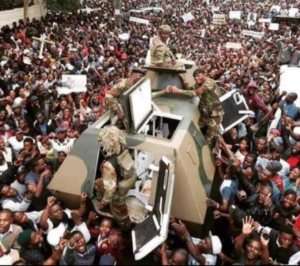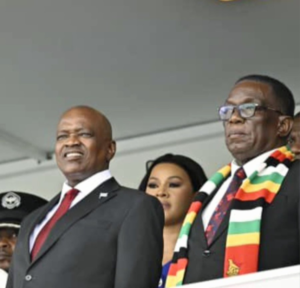ZIMBABWE CRACKS DOWN AHEAD OF BIG SUMMIT

Ahead of the Southern African Development Community (Sadc) summit in Harare next month, the Zimbabwean government is cracking down on any meetings by groups of people. The government fears protests in front of regional leaders.
President Emmerson Mnangagwa’s government is investing heavily in the Sadc summit. This summit is crucial for political legitimacy, especially after last year’s flawed general elections. The Sadc election observer mission rejected those elections.
The government is building roads, villas, refurbishing hotels, and buying buses for the summit. They want everything to look perfect for the event.
Today, police violently disrupted a meeting of the Zimbabwe National Students Union. The meeting was at 10 am at Zesa National Training Centre in Harare. Most of the 60 students attending the meeting were brutally assaulted. Some were arrested and taken to Harare Central Police Station. This action violated the students’ constitutional rights of freedom of assembly, association, and expression.
Lately, there has been a wave of arbitrary arrests, detentions, and harassment by the police. The government is clamping down on discontent.
Former minister and MP Jameson Timba and the Avondale 78 were arrested for merely gathering for a braai in Avondale, Harare, on June 16. They were commemorating South Africa’s Soweto Uprising (Youth Day).
Opposition leader Job Sikhala was released on January 30 after 595 days in prison. He did nothing wrong. He was charged with inciting public violence and convicted by a magistrate’s court. However, the High Court dismissed the conviction on Monday. The court also acquitted Sikhala of communicating false statements prejudicial to the state under a law that does not exist anymore.
The rights to freedom of expression, association, and peaceful assembly are severely restricted. This is particularly true during the election period and now, ahead of the Sadc summit. Opposition members, or those associated with the opposition, always suffer the most from this repression. They face arbitrary detention and prosecution.
Recent legislation, the “Patriotic Act,” is an amendment of the Criminal Law (Codification and Reform) Act. It imposes further restrictions and harsh penalties against activists and critics.
The government’s actions are a clear attempt to prevent any dissent during the Sadc summit. They want to show a picture of stability and control to regional leaders. However, this comes at the cost of the citizens’ rights and freedoms.
The international community is watching closely. There are concerns about the human rights situation in Zimbabwe. The crackdown on students, opposition members, and other citizens is alarming. It shows the lengths to which the government will go to maintain control and suppress dissent.
As the Sadc summit approaches, the tension in Zimbabwe is rising. The government’s heavy-handed tactics are likely to continue. The world will be watching to see how the situation unfolds. The Sadc summit is an important event for Zimbabwe, but it should not come at the expense of the people’s rights and freedoms.



